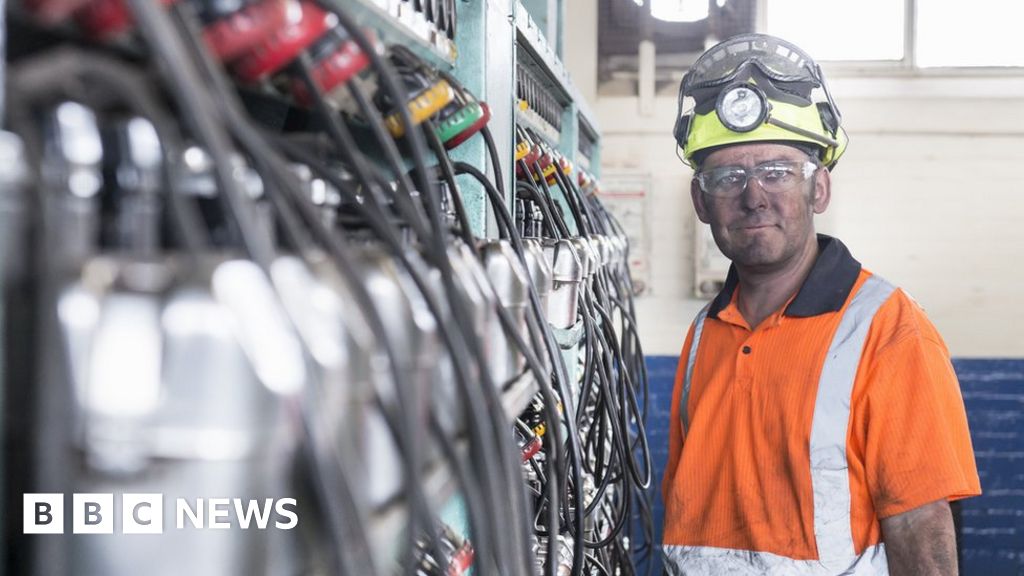 Cumbria coal mine: What is the controversy about? By Roger Harrabin
Cumbria coal mine: What is the controversy about? By Roger Harrabin
BBC environment analyst
Published
5 hours ago
Share
close Share page
Copy link About sharing Related Topics Climate change Image source, Getty Images The government has been set a deadline of 7 July to decide on whether to go-ahead with a new coal mine in the UK.
The Planning Inspectorate has sent its completed report on the Cumbria mine – including the summer deadline – to Communities Secretary Michael Gove who must now make the final decision.
Boris Johnson has previously said he said he was “not in favour of more coal” , but with 40% of the UK’s coking coal coming from Russia will the war in Ukraine change the government’s approach?
What is the case for the mine? The area, in north-west England, is dominated by the giant Sellafield nuclear plant, and West Cumbria Mining promises hundreds of well-paid jobs.
Coal from the mine will not be for general energy usage, but to mainly support the steel-making process in the UK.
Currently the industry relies on Russia for nearly half of its coal demand.But Johnson has said he wants the UK “to wean itself off Russian resources” following its unjustified attack on Ukraine.
Using British coal could also save the carbon emitted from shipping it from Australia or North America – it is estimated that 1.28 billion tonnes of carbon are produced from shipping coal around the world.
Why do environmentalists oppose it? Image source, West Cumbria Mining Company Image caption, The project is planned for a site near Whitehaven The UK, along with other countries, has agreed to drastically cut carbon.The government’s climate advisory Climate Change Committee also worries that allowing this mine to open would cause more problems.
It says to meet its carbon-cutting timetable, steel firms must stop burning coal by 2035 – unless they fit expensive technology to capture emissions and bury them underground.
The committee points out that 85% of the Cumbrian coal will be exported anyway, and every extra tonne of coal on the world market will tend to drive down the cost and drive up emissions.
Does the UK steel industry need Cumbrian coal? This is a controversial issue and few in the industry are prepared to speak publicly.
One said a supply of Cumbrian coal would allow his firm to save some cash by making more flexible orders.But he, and other industry figures I approached, said there were reliable supplies of suitable coal on the world market, and that Cumbrian coal was not essential for their business.
They also think investors will want to put money into clean steel production in future.
What is climate change? Six questions about the Cumbria coal controversy Coal mine plan to be re-examined What are the alternatives to coal for the steel industry? Steel-making is a problem area for climate change, but firms are developing technologies like electric arc furnaces – which melt down recycled steel – and hydrogen, which can be used to make steel for cars.
Supporters of the mine say coal will definitely be needed for steel after the climate committee’s 2035 deadline.
But the European steel industry, Eurofer, told me clean steel technologies might be available by then – so long as governments support research and development, and block unfair competition from dirty steel imports.
What about the jobs? Image source, Getty Images Image caption, The last deep coal mine, Kellingley Colliery in Yorkshire, was closed in 2015 The firm says the mine will create 500 jobs, but sceptics think that is exaggerated.
Unemployment in the area is lower than the national average, but over 40 Conservative MPs have signed a letter in support of the mine.
Are other countries facing the same dilemmas? Every nation accepts that carbon emissions should be cut immediately.But countries with valuable fossil fuel reserves don’t want to abandon them and the jobs they sustain – even if renewable technologies may create more jobs elsewhere.
This applies to China and the US – where President Biden has not banned fracking.The UK is phasing out coal for electricity from 2024 but ministers suggest there’s still a case for producing suitable coal for steel.
The issue is embarrassing for the UK, because it initiated the global “Powering Past Coal” alliance of countries seeking to persuade others to swap jobs in coal for jobs in clean sectors.
What happens now? Cumbria County Council had originally backed plans for the new mine, but decided in February to review its decision.
The Planning Inspectorate has now completed its report into the mine following a public inquiry which ended in October.
This report has been sent to Mr Gove, who under planning law, is supposed to make that decision without referring to his colleagues.
But it’s barely conceivable that Boris Johnson, with his reputation on the line, won’t find a way of pointing him in the right direction – whichever way he thinks that is.
Follow Roger on Twitter @rharrabin
Related Topics Steel industry Climate change Coal mining.